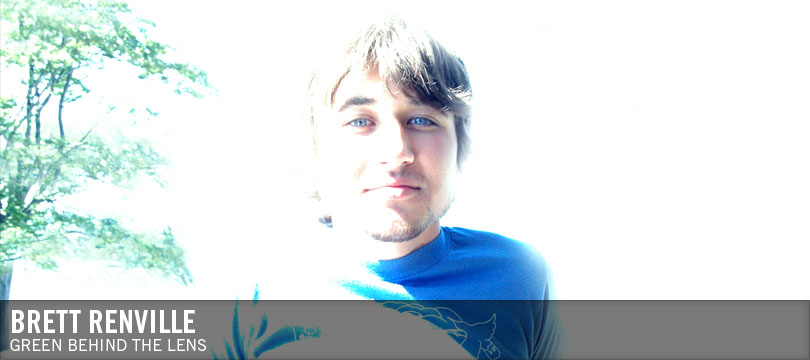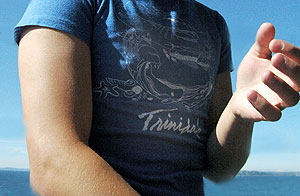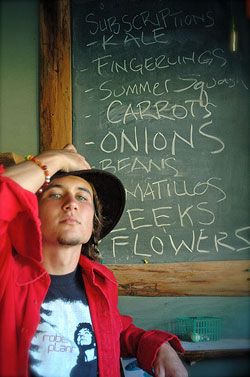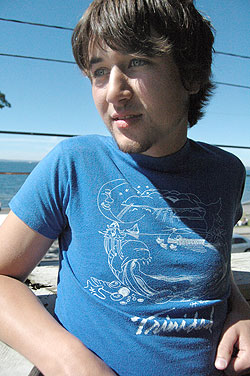
I’m not sure how interesting I am," filmmaker Brett Renville says as he sits in my kitchen, his hands tapping lightly against faded jeans as he offers a shy grin. "I grew up in Bothell, Washington. I spent a lot of time outdoors. My parents and I would go up to the San Juans and just spend like, a week on the boat. We’d always go out fishing - which I don’t do anymore because I’m a vegetarian."
 This last sentence is uttered with another flash of teeth and a faux emphasis on the last word. His full-on dedication to his chosen herbivorous lifestyle is hard to miss. It filters into all other areas of his life as he finds ways to creatively mesh his profession with his passion: growing things.
This last sentence is uttered with another flash of teeth and a faux emphasis on the last word. His full-on dedication to his chosen herbivorous lifestyle is hard to miss. It filters into all other areas of his life as he finds ways to creatively mesh his profession with his passion: growing things.
"One thing I think every American should do with a yard is just dig it up and plant a garden," Renville reveals good-naturedly. "Either that or let it go to meadow," he laughs, eyes flicking downward. "I have to admit, I’m a little sick of the green grass with the white picket fence."
At only 22, Renville is steadily gaining ground in not only his career as a filmmaker, but towards his personal goal of raising awareness about alternative farming practices and environmental conservation. He recently worked on Evergreen, a film that premiered at the 2009 SIFF (Seattle International Film Festival) Cinema.
"One thing I think every American should do with a yard is just dig it up and plant a garden," Renville reveals good-naturedly. "Either that or let it go to meadow."
"Evergreen is a great film," enthuses Renville. "It was produced by a Seattle production company called More Dust than Digital and addresses the future of wind power, solar power and other clean technologies in Washington State. It’s definitely a film that our generation needs to see."
Sowing the Seeds
"I started off filming the family dogs," Renville recounts as he refolds his arms and observes the pattern on my tablecloth absently, "We had one of those old Hi8 cameras and my dad always filmed all of my football games so after the game I’d just take the camera and film all of my teammates, asking them things like, ‘Hey what did you think of the game? How was that touchdown?’ he smiles in remembrance. "My first foray into interviewing."
Propelling his interest in filming even further was Renville’s high school video production class, presided over by a well-loved teacher named Dave Elevrum.
"Mr. Elevrum was awesome," says Renville. "I have to credit him with kicking off my desire to be a filmmaker. I’d film him doing episodes of a series called, ‘Mr. Elevrum’s Neighborhood’ which was featured on the school news once a week. I’d just follow him around while he did whatever it was he was doing. He was a total character and always had great things to say."
Bitten hard by the filmmaking bug, Renville went on to complete an epic 3½ hour documentary during his last year of high school. He can’t help but laugh as he recounts his first "feature-length" film.
"Just knowing those people and then watching the footage I captured of them really made me appreciate and enjoy shooting and editing,"
"Yeah, it was really long. But I documented my entire senior year. I selected a group of my friends and just filmed them doing everything, some of it a little crazy."
Because the film wasn’t for extra credit or an assigned project Renville would stay long hours after school and would often use his lunch hour to edit. Looking back, he’s grateful to his friends who allowed him to film them throughout the year. "Just knowing those people and then watching the footage I captured of them really made me appreciate and enjoy shooting and editing," he says. "It was that simple. After that experience I just wanted to get into filmmaking even more."
New Shoots Yield Creative Solutions
Fresh on the heels of his graduation from the Seattle Film Institute in 2006, Renville proved his chops working as a cameraman on the independent documentary, Blood on the Fast Track: Rise of the Rat City Roller Girls, which was in the 2007 SIFF and received an Audience Award. He then went on to work on Dear Lemon Lima, a short-turned-feature film that will be premiering this July at the Los Angeles Film Festival.Renville also owns his own production company, Leaning Wolf Productions that specializes in film and video production for documentary and commercial projects. He has been experiencing some recent success as the result of a creative concept he calls "Lifestyle Home Videos".
"I recently had some clients who had put a lot of work into their house and were about to sell it and so they hired me to film a sort of ‘keepsake’ video for themselves," Renville explains. "We then came up with the idea to use the video to actually help sell the house, as well. We put it up on their realtor’s website and in two-and-half weeks their house sold. They got almost 500 inquiries through the video."
Our Own Garden
Along with running Leaning Wolf Productions, Renville is also approaching the finish line of a very special, personal project that has been two years in the making. He will soon make his directorial debut with Our Own Garden, a self-funded documentary about the future of American agriculture and the changes in both industry and society that he feels need to take place.
"In 2004, I went to a Farm Aid concert in Seattle," he shares. "I saw artists like Willie Nelson, Neil Young, John Mellencamp and it was great. But even more than that - the experience changed my whole perspective on the way I look at food."
"I decided I wanted to make a film about what we need to do in order to move forward...For our own good we need to move towards a more organic-based agriculture system, so that’s what the film is about."
The conscious shift in thinking brought him to eat only organic foods and actively seek ways to support local farmers and farmers markets, which not surprisingly brought out in him a natural interest in farming.
 "One thing I’m passionate about for sure, is farming," Renville speaks quietly, an undercurrent of conviction infusing his words. "I decided I wanted to make a film about what we need to do in order to move forward. We’re pouring so many pesticides and chemicals on the land that we’re ruining our soil -- depleting our soil, actually. For our own good we need to move towards a more organic-based agriculture system, so that’s what the film is about."
"One thing I’m passionate about for sure, is farming," Renville speaks quietly, an undercurrent of conviction infusing his words. "I decided I wanted to make a film about what we need to do in order to move forward. We’re pouring so many pesticides and chemicals on the land that we’re ruining our soil -- depleting our soil, actually. For our own good we need to move towards a more organic-based agriculture system, so that’s what the film is about."
A director with his game together, Renville managed to come away with an impressive panel of contributors to his film. Alongside farmers and cooperative organizers, scientists and environmental experts willingly shared information and imparted their viewpoints. Musicians and activists such as Willie Nelson, Dave Matthews and Neil Young appear. Authors Michael Pollan, Rory Freedman, Kathy Freston and Jeffrey Mason weigh in, as well as University of Washington geologist, David Montgomery and Humane Society President, Wayne Pacelle.
"Getting the interviews was really hard," Brett recalls, expelling a sigh. "I got turned down a lot. I think that’s just one thing you have to accept being a documentary filmmaker – not getting the interviews you want."
His original plan was to cover both sides of this story. Unfortunately, most of the animal industry and pesticide industry flatly turned down his requests for interviews.
"I wanted to give them a chance to tell their side of things," Renville continues. "But the large agro businesses didn’t want to be involved in anything. I was able to interview a lot of animal farmers, so in the end got a pretty well rounded perspective. You know, so it’s not just a film full of vegetarian people ranting," he adds with a laugh.
Practicing what he Preaches
"I have my own garden," Renville shares enthusiastically. "It’s pretty big. A couple of years ago I talked my parents into letting me dig up this big patch of yard on their property to put it in."
He lists off a litany of vegetables with a fervor that can only be classified as devout. "I grow potatoes (russet, red, fingerlings) beans (wax, bush, string-less) snap peas, carrots, garlic, red kale, mixed greens, collard grebes, kohlrabi, herbs, broccoli, strawberries (regular and golden pineapple) and raspberries."
He takes a breath, looking upward as if he is imagining more vegetables dancing in a ring above my head. "I think that’s it," he says, finally. "I also get a box of produce every week through my CSA (community supported agriculture) program. I definitely do everything I can to practice what I preach."
Renville is also currently working for a CSA farm, Full Circle Farms to produce a series of online "How-To" videos that will demonstrate how to do everything from harvesting to planting a greenhouse.
Future Harvests
Taking a moment to ponder his future, Renville rocks back slightly in his chair, his fingers back to their familiar tapping.
"I’m still finishing Our Own Garden but I have also started researching my next documentary, an exploratory piece on a topic that I’m still defining. What I do know is that I need to take something that I think is interesting and make it absolutely fascinating to other people. That’s the tricky part."
"Filming interviews is what I love to do the most, finding out what people have to say and feeling trusted by them to deliver that message."
 Renville aspires to learn continuously, his favorite method being that of observation. "In film school I think we watched around four films a week in just one class," he says. "We’d take a film and just analyze it and that’s what I enjoyed most. I still do that today. I watch almost eight movies a week in effort to keep current, analyze styles and get shot ideas. The best thing is to watch the really bad movies, just so you know what not to do."
Renville aspires to learn continuously, his favorite method being that of observation. "In film school I think we watched around four films a week in just one class," he says. "We’d take a film and just analyze it and that’s what I enjoyed most. I still do that today. I watch almost eight movies a week in effort to keep current, analyze styles and get shot ideas. The best thing is to watch the really bad movies, just so you know what not to do."
When prodded for his reflections on creativity, Renville pauses liberally. "Overall, I love finding creative ways to capture reality. Filming interviews is what I love to do the most, finding out what people have to say and feeling trusted by them to deliver that message. Having conversations with people and being able to preserve those singular interactions on film fascinates me."
He hopes to not only to continue making films, but also making sure things continue to grow around him. "I do want to have a farm someday," he admits. "I’d love to move out of my apartment, get a piece of land and – well, grow and film."











